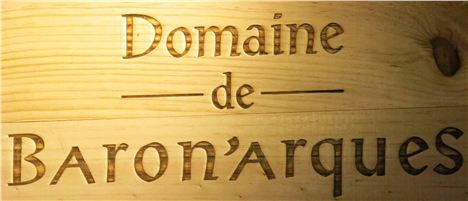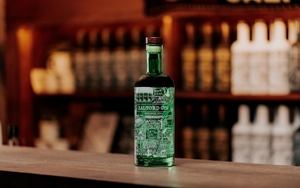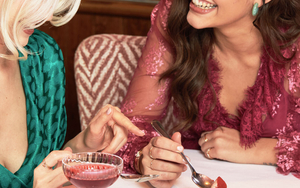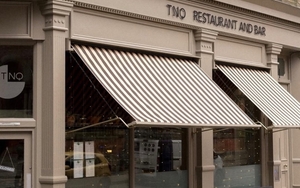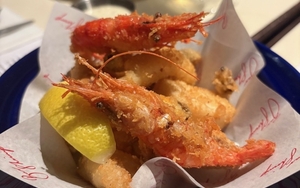TWO men are flashing tantalising images from their mobiles at each other and almost purring. All perfectly innocent. Just two legendary sommeliers happy to share shots of great recent bottles they have sampled. There’s no oneupmanship here; there’s nothing to prove.
For George Bergier and Garry Clark wine is their world and there are always new horizons to explore. Which is good for the punters benefiting from their discoveries across Manchester’s Chop Houses – Tom’s, Sam’s and Albert’s.
Foolishly I interrupted Gordon by saying: "Look, I’ve just squeezed the oranges", as if that made up for it. Mass intake of breath from all the chefs. Then I got it.
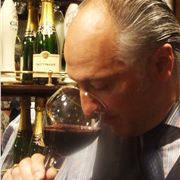 George BergierGeorge, wine buyer for the group, really needs no introduction in the city. Garry, newly arrived restaurant manager at the Albert Square Chop House, may. Teaming him with George is like Barcelona having Messi and then signing Neymar. It consolidates a remarkable commitment to wine that saw Albert’s scoop an Award of Excellence from the influential American magazine Wine Spectator in 2013 – an astounding achievement for a restaurant within a year of its opening – and recently retain it. Only 21 other UK establishments hold the honour.
George BergierGeorge, wine buyer for the group, really needs no introduction in the city. Garry, newly arrived restaurant manager at the Albert Square Chop House, may. Teaming him with George is like Barcelona having Messi and then signing Neymar. It consolidates a remarkable commitment to wine that saw Albert’s scoop an Award of Excellence from the influential American magazine Wine Spectator in 2013 – an astounding achievement for a restaurant within a year of its opening – and recently retain it. Only 21 other UK establishments hold the honour.
Much credit goes to its launch sommelier, Marcin Oziebly, who has since left for London. In his place comes Garry in the overseeing role of restaurant manager. With him he brings a formidable track record in the business. For the past decade he has marshalled the world famous cellars of the Chester Grosvenor Hotel, working closely with Michelin-starred chef Simon Radley; before that he got his sommelier baptism of fire under Gordon Ramsay and was Mr Wine at Gleneagles in the Highlands.
I met him over a velvety red from the Languedoc, Domaine de Baron’arques, which the Rothschild wine dynasty has bottled especially for the Chop Houses...
So what, Gary, at the age of 43 and almost a piece of the furniture at the Grosvenor, made you switch to Manchester?
It was one of those things where I’d become stuck in a rut. I’d achieved most of what I’d set out to do. I didn’t see progression any more. When Marcin left George contacted me, asking me if I knew anyone who could replace him. I’d had a crappy day at work and fired my own CV off. I came in for a chat and the restaurant manager job came up and I was knocked over by the prospect.
Albert’s Chop House is up for Food Pub of the Year in this year’s Manchester Food and Drink Awards. Surely a ‘pub‘ is a step down from all that Michelin formality?
There are many kinds of top quality dining experience. Here is just different to the Grosvenor. Nothing is going to break the bank, but it’s a tremendous food offering. We’ve just been trying the new dishes for the menu. There is some very exciting stuff going on under our new head chef, Vally (Stuart Valentine has taken over over from the departed Paul Faulkner with Jacques Hilton as his senior sous).
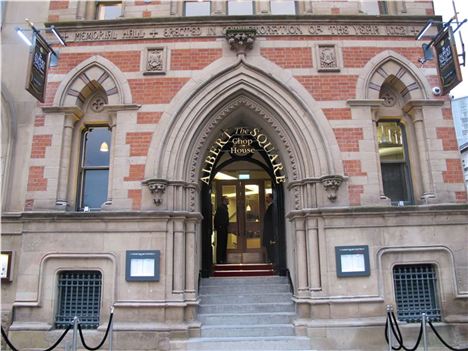 Albert's exterior hides a cornucopia of wine expertise
Albert's exterior hides a cornucopia of wine expertise
What do you think of the Manchester scene?
Manchester is so vibrant, like all the great mercantile cities, consistently reinventing itself. It’s less social class driven than London. People judge everything on its merits. There’s a strong working class ethic. No bullshit. I see London operations like Hawksmoor moving up; I’m sure the Chop House can more than hold their own against such opposition.
But you’re not moving house to the city...
My wife has a successful business near our home at Hawarden, the other side of Chester, so it makes sense to commute.
You have left behind a stellar collection of wines. You must miss them?
I’ve come from a cellar full of old Burgundies. I’m having to recalibrate my palate. Lots changed there, though, during my time. The whole business model chain was restructured. When I arrived there was half a million pounds’ worth of wine in stock, much of it Old Word, trophy wines you wouldn’t sell every day; by the time I left it was down to £160k. There were sometimes five cases of each wine on the list. It wasn’t sustainable. We got it down to perhaps just three bottles of each. That actually increased choice for our customers.
How are you going to increase choice for your new regulars?
We want to open up the wine list, make it more accessible. You have a flat profit margin at the lower end and a smaller margin at the upper end to encourage customers to try all our best bottles. That's why we have got a Coravin machine on the way. So our customers might be able to try, say, a stonking, iconic wine like Sassicaia by the glass, when they might not feel they could afford to buy a whole bottle.
For wine geeks: The Coravin System uses technology that keeps the cork in the bottle, where it's been since the bottle was sealed. A thin hollow needle is inserted through the cork to access the wine. It leaves the cork intact. When the needle is removed, the cork reseals and continues to protect the wine from oxidizing as if it had never been opened. Very, very clever stuff.
The Chop Houses are already famous for their bin-end bargains from famous names as well as their wine dinners. Will all this continue?
Definitely. The wine dinners a terrific thing for our customers. I have a few contacts to call on (he says modesty) and I’m sure we’ll continue to line up some interesting ones.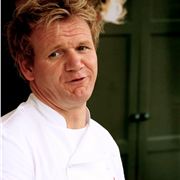 You worked for Gordon Ramsay. As restaurant manager, are you going to employ his man-management skills?
You worked for Gordon Ramsay. As restaurant manager, are you going to employ his man-management skills?
Gordon (right) was fine as long as you gave 100%. He’s an amazing person to work for, a totally focused, driven man. When I worked for him he was juggling three restaurants in London, Glasgow and Dubai. He was very hands on. Working for him opened doors for me. The wine samples we got sent were spectacular, allowing me to taste some I’d never normally get the chance to. When I started at Amaryllis (Ramsay’s Michelin-starred Glasgow outpost, which shut in 2004) I had very little wine knowledge and suddenly I was thrown into a lead role. It was a wonderful opportunity. I was sent to London to do stages at Ramsay restaurants with the Master Sommelier Ronan Sayburn.
You really are besotted with wine. As evidence here’s an account of that time you gave in an interview a while back...
“It was at that time that I started to collect wine lists, primarily as a source of ideas both for content and presentation. Over the course of my career I think I have collected nearly 300 lists, from small bistros to internationally acclaimed restaurants such as the French Laundry, El Bulli, the Herbgarden, and of course the Ramsay stable of restaurants including at that time Petrus. And as I read through those lists, I found myself becoming jealous of some of them. I saw iconic wines that I could only ever read about. Harlan Estate, Domaine de la Romanee Conti, Krug, Mouton Rothschild, Petrus, Le Pin, L'Ermita, Pingus, Sassicaia, Masseto and so on. And the hype that surrounds many of these iconic wines fuels the desire to list them, to own them and be in control of them. And then reality sets in.”
All very encouraging, but you must have had the hair-dryer treatment from Gordon, too?
Yes, I had one major bollocking. It had been my night off. A Michelin inspector had been in. He asked for a vodka and orange and was served carton orange juice, not fresh, in it. He asked to speak to the chef. The chef was on service and wouldn’t come out and speak. Next morning the inspector phoned Gordon about it and he instantly flew up to investigate.
I didn’t know what had gone on and ironically was squeezing juice for the breakfast when he arrived. Foolishly I interrupted Gordon by saying "Look, I’ve just squeezed the oranges’’, as if that made up for it. Mass intake of breath from all the chefs. Then I got it. I was soon forgiven, Gordon was like that. But the head waiter moved on.
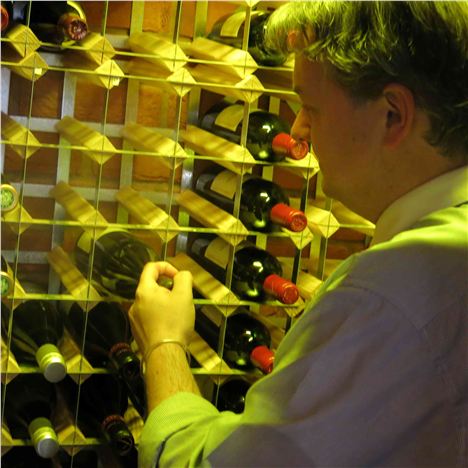 Picking a winner from the racks
Picking a winner from the racks
Was Gleneagles very different? Surely a calmer place (when they are not holding the Ryder Cup there – editor)?
Gleneagles was a stunning place. You think you’d never want to leave. Many staff there had never worked anywhere else, but the political side of it was a nightmare. I went as a sommelier but was soon promoted to joint deputy head, running the section. But I was never allowed to choose one wine to buy for the list. I had to leave and then the Chester Grosvenor came up.
Were there fine vintages around at home when you were growing up?
No, definitely not. My father was teetotal, my mother drank little. I went to York University to study to be a primary school teacher. I was soon running the college bar and I realised teaching was not going to be for me. I fell in love with wine and got a job working for the Malmaison hotel group, which had a strong wine training programme. The wine list changed on a seasonal basis and the lists contained wines from the south of France that are now trendy but were barely known then – Picpoul, Collioure. A good grounding.
Was there one Road to Damascus moment?
Not really. There have been loads of little moments. You’ll stumble upon a wine that reinvigorates you. I’ve been exceptionally fortunate to have had access to wine tastings that have bene extraordinary. Sampling Clos de Menil in the Clos de Menil (Champagne) vineyards. A moment that can’t be bought.
That’s for the connoisseur. Surely all that stuff goes above the public’s head?
Don’t underestimate changing palates. The biggest change in the industry is the public learning about wine through varietals. Before they were often intimidated by labels. The public is more varietally aware and that’s where France can suffer. The ordinary drinker seems to love Sauvignon, especially through New Zealand, but lots of drinkers don’t realise, say, that Sancerre is made from Sauvignon.
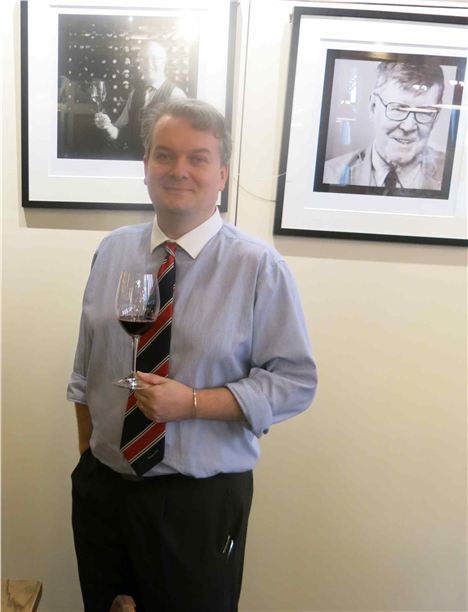 Bookended by George Bergier and Alan Bennett in Albert's restaurant
Bookended by George Bergier and Alan Bennett in Albert's restaurant
Are we too obsessed with good vintages?
At the end of the day a vintage is an important pointer, but even in the best vintages with a perfect crop, a crap winemaker will still make a crap wine.
That brings me on to Natural Wines (beyond organic and made with minimal chemical and technological intervention). They are being talked about a lot at the moment...
I can see why. They are in tune with interest in naturally produced foods, but these wines are a big risk factor in a restaurant. Most of the ones I have tasted have been dirty, tainted, foul. The producers just don’t know how to make wine. Quality, top-end winemakers interfere as little as possible during the process anyway. Their wines are as pure as can be, but they have to use a small amount of sulfites to safeguard the product.
So we won’t be seeing any of those on your list soon. What is ‘the next big thing’ in your opinion?
There are actually lots of exciting areas coming through. South Africa, in particular, is phenomenal right now. Sometimes though, as elsewhere, it is hidebound by regulations and obstacles. That fine winemaker Bruce Jack at Flagstone had done an old vine Chenin Blanc, a wine so out of character from what is expected of Chenin nowadays that it was rejected as ‘untypical’. He couldn’t get it certified. He replied: “Everything else is untypical.”
And English wines?
They are becoming more and more successful. 2013 is looking like a very decent vintage. We plan to feature them at Albert’s Chop House, probably with a wine dinner.
So what is a good wine, Garry?
One you enjoy whatever the price.
Finally, what’s the best wine to accompany corned beef hash (a Chop House signature dish)?
It might even be a pint of cask ale. We have got a strong selection of those, too.
(Your interviewer takes his leave and heads for the bar to refresh his palate with a pint of foaming, floral Albert Square Best Bitter).
Albert Square Chop House, Memorial Hall, 14 Albert Square, Manchester M2 5PF. 0161 834 1866.
Garry Clark is a big fan of Twitter. Share his amazing expertise via @ChopChopGrazza









